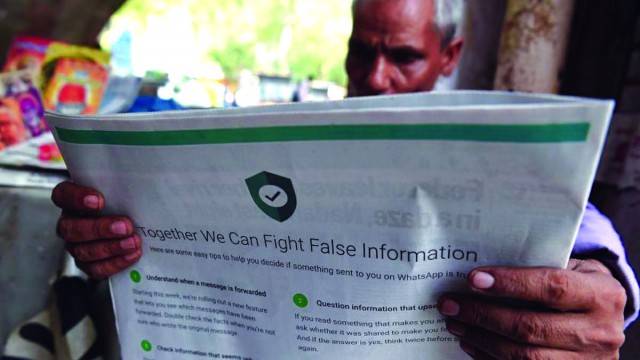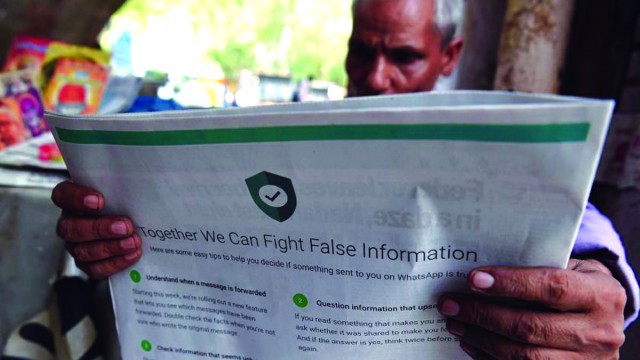
EU Disinfo Lab has recently uncovered a global network of pro-India fake websites and think-tanks. The network has been pushing anti-Pakistan agenda to influence decision-making in international institutions since 2005. It has been actively engaged in a disinformation campaign against Pakistan and has influenced the internal and external affairs of the UN member states. Due to this hate-speech and propaganda, Muslims in Pakistan, India, and Kashmir are endangered. State-sponsored fake news is thus considered a substantial security threat. It also challenges legal framework designed to maintain international peace and security.
Article 2 (4) of the UN Charter refrains all states from acting against the territorial integrity or political independence of any state. UN General Assembly Resolutions (for example, the Declaration of the Inadmissibility of Intervention and Interference in the Internal Affairs of States 1981) further recognize the principle of non-intervention. This principle has acquired the status of ‘jus cogens’ (the principles which form the norms of international law that cannot be set-aside). In the Nicaragua case, the ICJ held that the principle of non-intervention protects the sovereignty of states allowing them to decide in ‘internal and external affairs’ without intervention by other states.

The UN General Assembly’s Friendly Relations Declaration makes it clear that the use of physical force is not the only form of coercion. M.N. Schmitt in Tallinn Manual (2017) defines coercion as “an affirmative act designed to deprive another state of its freedom of choice, that is, to force that state to act involuntarily or involuntarily refrain from acting in a particular way.” The Indian network emphatically lobbied against Pakistan in international capitals on the bases of false facts to deprive other states from freedom of choice and action. Therefore, India’s conduct amounts to coercion and the violation of Article 2 (4) of the UN Charter and the customary international law.
The International Law Commission’s articles on the Responsibility of States for Internationally Wrongful Acts 2001 (ARSIWA) outline an ‘internationally wrongful act,’ such as India’s perverse efforts to erode sovereignty and territorial integrity of Pakistan and western states, as a breach of international obligations. Under Article 1 of ARSIWA, every internationally wrongful act of a state entails the international responsibility of that state. According to Article 8, the conduct of news corporations can be attributed to a state, if it directed or controlled the company’s actions. Admittedly, Srivastava Group, that owns and runs fake websites, is an Indian entity. Thus, the conduct of this news corporation or entity can be attributed to India.
Article 40 of ARSIWA provides that “the international responsibility is entailed by a serious breach by a state of an obligation (i.e. to recognize the sovereignty and territorial integrity of other states) arising under a peremptory norm of general international law.” A breach of such an obligation is serious if it involves a gross or systematic failure by a state to fulfil that obligation. Operating a network of false news to undermine the sovereignty and territorial integrity of Pakistan is a gross failure of India to meet its obligations under the international law. Considering the importance of the sovereignty and territorial integrity of states, Article 41 requires that “states shall cooperate to bring to an end through lawful means any serious breach…”
Therefore, it is the command of international law that other states cooperate with Pakistan to bring to an end to Indian breaches through legal means under Chapter VII of the UN Charter.
In addition, under ARSIWA, Pakistan and other states can seek remedies of cessation and non-repetition (Article 30), reparation (Article 31) in the form of restitution, compensation and satisfaction (Articles 34-37) against India.
Further, the 1936 International Convention on the Use of Broadcasting in the Cause of Peace (the 1936 Convention) aims to safeguard good international understanding and common interest of contracting states. The UN General Assembly confirmed the 1936 Convention after WWII. India is a party to this convention. Article 3 of the convention applies to false news. It requires the contracting states to prohibit and stop transmission likely to harm good international understanding without delay. Article 4 of the convention envisages due diligence and fact-check obligation on the states before broadcasting information concerning international relations. While disseminating false news against Pakistan, India has violated its obligations under the Convention. Thus, the contracting states should hold India liable for the infringement of its obligations under the 1936 Convention.
India has interfered in the internal and external affairs of Pakistan and other states. This is a breach of its obligation under the UN Charter and the customary norms of general international law. Therefore, the international community is obliged to hold India accountable for the continuous violation of its international obligations.
The UN needs to consider how India has exploited and misused international institutions. How it has misrepresented and defrauded the international community. The western states are obliged to investigate the finances and transparency of the NGOs, websites, domains, and media channels that are being used in a sinister campaign against Pakistan. The individuals and entities inciting hatred and violence against the Muslims should be prosecuted for ‘crimes against humanity.’ Finally, India must answer for misleading international institutions and threatening international peace and security.
The writer is an advocate in the Supreme Court of Pakistan
Article 2 (4) of the UN Charter refrains all states from acting against the territorial integrity or political independence of any state. UN General Assembly Resolutions (for example, the Declaration of the Inadmissibility of Intervention and Interference in the Internal Affairs of States 1981) further recognize the principle of non-intervention. This principle has acquired the status of ‘jus cogens’ (the principles which form the norms of international law that cannot be set-aside). In the Nicaragua case, the ICJ held that the principle of non-intervention protects the sovereignty of states allowing them to decide in ‘internal and external affairs’ without intervention by other states.

The UN General Assembly’s Friendly Relations Declaration makes it clear that the use of physical force is not the only form of coercion. M.N. Schmitt in Tallinn Manual (2017) defines coercion as “an affirmative act designed to deprive another state of its freedom of choice, that is, to force that state to act involuntarily or involuntarily refrain from acting in a particular way.” The Indian network emphatically lobbied against Pakistan in international capitals on the bases of false facts to deprive other states from freedom of choice and action. Therefore, India’s conduct amounts to coercion and the violation of Article 2 (4) of the UN Charter and the customary international law.
The International Law Commission’s articles on the Responsibility of States for Internationally Wrongful Acts 2001 (ARSIWA) outline an ‘internationally wrongful act,’ such as India’s perverse efforts to erode sovereignty and territorial integrity of Pakistan and western states, as a breach of international obligations. Under Article 1 of ARSIWA, every internationally wrongful act of a state entails the international responsibility of that state. According to Article 8, the conduct of news corporations can be attributed to a state, if it directed or controlled the company’s actions. Admittedly, Srivastava Group, that owns and runs fake websites, is an Indian entity. Thus, the conduct of this news corporation or entity can be attributed to India.
Article 40 of ARSIWA provides that “the international responsibility is entailed by a serious breach by a state of an obligation (i.e. to recognize the sovereignty and territorial integrity of other states) arising under a peremptory norm of general international law.” A breach of such an obligation is serious if it involves a gross or systematic failure by a state to fulfil that obligation. Operating a network of false news to undermine the sovereignty and territorial integrity of Pakistan is a gross failure of India to meet its obligations under the international law. Considering the importance of the sovereignty and territorial integrity of states, Article 41 requires that “states shall cooperate to bring to an end through lawful means any serious breach…”
Therefore, it is the command of international law that other states cooperate with Pakistan to bring to an end to Indian breaches through legal means under Chapter VII of the UN Charter.
In addition, under ARSIWA, Pakistan and other states can seek remedies of cessation and non-repetition (Article 30), reparation (Article 31) in the form of restitution, compensation and satisfaction (Articles 34-37) against India.
India has interfered in the internal and external affairs of Pakistan and other states. This is a breach of its obligation under the UN Charter and the customary norms of general international law
Further, the 1936 International Convention on the Use of Broadcasting in the Cause of Peace (the 1936 Convention) aims to safeguard good international understanding and common interest of contracting states. The UN General Assembly confirmed the 1936 Convention after WWII. India is a party to this convention. Article 3 of the convention applies to false news. It requires the contracting states to prohibit and stop transmission likely to harm good international understanding without delay. Article 4 of the convention envisages due diligence and fact-check obligation on the states before broadcasting information concerning international relations. While disseminating false news against Pakistan, India has violated its obligations under the Convention. Thus, the contracting states should hold India liable for the infringement of its obligations under the 1936 Convention.
India has interfered in the internal and external affairs of Pakistan and other states. This is a breach of its obligation under the UN Charter and the customary norms of general international law. Therefore, the international community is obliged to hold India accountable for the continuous violation of its international obligations.
The UN needs to consider how India has exploited and misused international institutions. How it has misrepresented and defrauded the international community. The western states are obliged to investigate the finances and transparency of the NGOs, websites, domains, and media channels that are being used in a sinister campaign against Pakistan. The individuals and entities inciting hatred and violence against the Muslims should be prosecuted for ‘crimes against humanity.’ Finally, India must answer for misleading international institutions and threatening international peace and security.
The writer is an advocate in the Supreme Court of Pakistan

